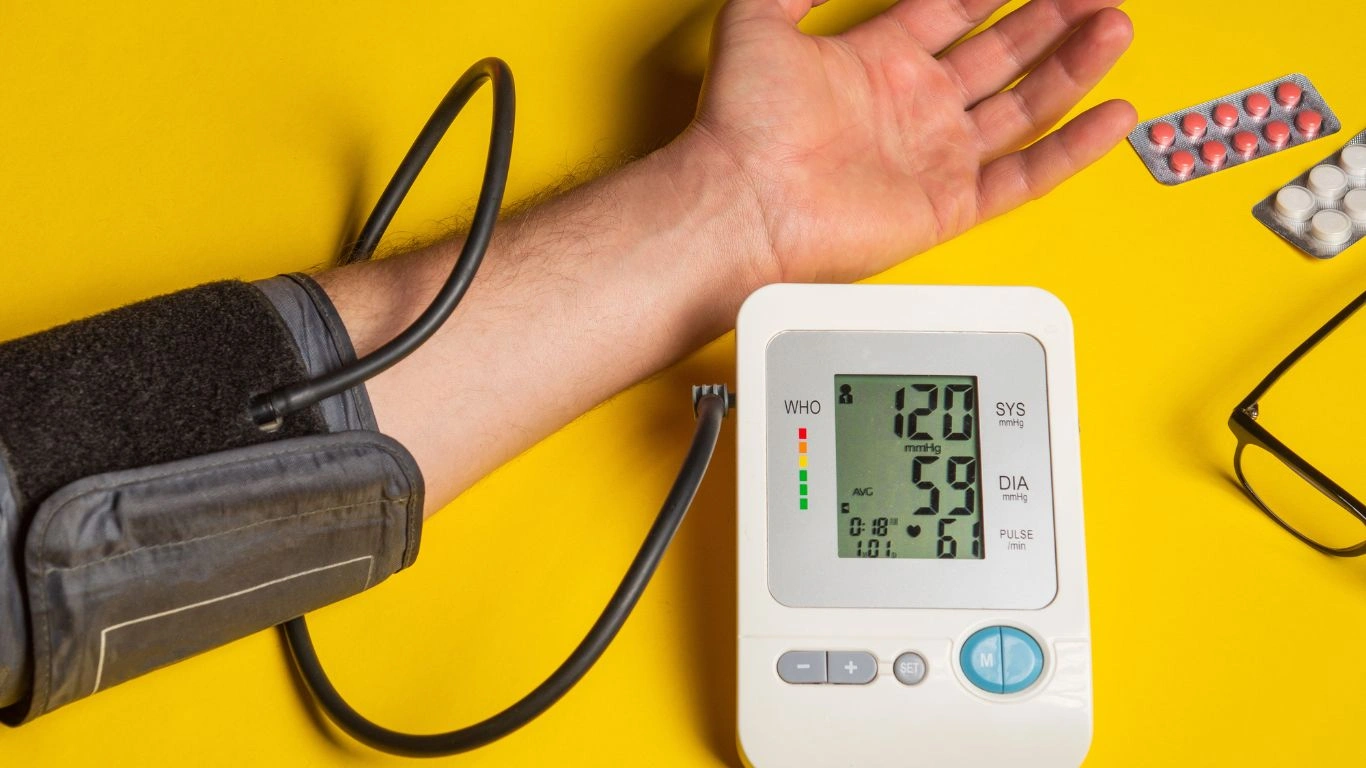Unlock the Link Between Poor Gut Health and Hypertension for Better Health
As an Internal Medicine Physician with a focus on hypertension management, I’ve seen firsthand how complex hypertension can be. It’s not just about monitoring blood pressure or prescribing medications. A deeper look reveals that the health of our gut might play a bigger role in managing blood pressure than we previously thought. The link between poor gut health and hypertension has been a topic of growing interest, and there’s more to this connection than meets the eye. In this article, we’ll dive into how your gut microbiota, the community of microorganisms living in your digestive system, may influence hypertension and what you can do about it.
The Fascinating Gut-Hypertension Connection

Many people think of hypertension as simply a problem of blood vessels and the heart, and while that’s true, there’s a growing body of evidence showing that the gut plays a critical role in blood pressure regulation. The gut is often referred to as our “second brain,” due to its vast network of nerves and its ability to influence so many aspects of our health, from digestion to mood. But what does it have to do with hypertension? The answer lies in the gut microbiota – the collection of bacteria, fungi, and viruses living inside our intestines. These microorganisms have a far-reaching effect on many bodily functions, including our cardiovascular health.
What is Gut Health, and Why Does It Matter?
Gut health refers to the balance of bacteria, good and bad, in our digestive system. When our gut microbiota is in balance, we feel good – digestion is smooth, the immune system is functioning properly, and our body is able to absorb nutrients effectively. But when that balance is disrupted – something known as dysbiosis – it can lead to a range of health issues, from bloating and fatigue to more serious conditions, such as hypertension. You might not immediately think of your gut when you’re trying to manage your blood pressure, but the two are more connected than you might think.
Over the years, I’ve seen patients who struggle with high blood pressure despite adhering to medication and lifestyle changes. When we take a closer look at their diet and overall gut health, it’s often clear that there’s an imbalance in their microbiota. This imbalance can lead to inflammation and an overactive immune response, both of which contribute to increased blood pressure. The gut may be the missing link in hypertension management that many of us have overlooked.
The Science Behind the Gut-Hypertension Link

So, how exactly does gut health affect blood pressure? It comes down to a few key factors. First, gut bacteria play an essential role in the production of short-chain fatty acids (SCFAs). These fatty acids are byproducts of fiber digestion and are known to have anti-inflammatory effects. When the gut is healthy and balanced, SCFAs help regulate blood pressure by improving blood vessel function and reducing inflammation. On the flip side, when the gut is unbalanced, SCFAs are not produced effectively, contributing to inflammation and, ultimately, higher blood pressure.
Another crucial element is the gut-brain axis – the communication pathway between your gut and your brain. This connection is constantly sending signals back and forth, and an imbalance in gut bacteria can cause stress responses in the body, increasing blood pressure. Stress is a known contributor to hypertension, and when your gut health is compromised, it may trigger a cascade of stress-related hormones that elevate your blood pressure.
Furthermore, gut bacteria influence the production of certain hormones and metabolites that affect blood pressure regulation. For instance, some gut bacteria help produce a hormone called angiotensin, which plays a role in regulating blood pressure. If the gut microbiota is out of balance, it can lead to an overproduction of angiotensin, causing blood vessels to constrict and raising blood pressure.
The Role of Diet in Gut Health and Hypertension
One of the most effective ways to improve gut health – and, by extension, help manage hypertension – is through diet. A diet rich in fiber, prebiotics, and probiotics can foster a healthy gut microbiota. Prebiotics are food components that feed good bacteria, while probiotics are live bacteria found in fermented foods that can help replenish the gut with beneficial microorganisms.
As an internal medicine physician, I often recommend incorporating fermented foods like yogurt, kefir, sauerkraut, and kimchi into daily meals. These foods are rich in probiotics and can help restore balance in the gut. Additionally, a diet high in fruits, vegetables, whole grains, and legumes provides the necessary fiber to support the growth of good bacteria. These fiber-rich foods are essential for the production of SCFAs, which, as we discussed, play a key role in reducing inflammation and managing blood pressure.
How Poor Gut Health Affects Your Hypertension Treatment

For many individuals struggling with high blood pressure, conventional treatment plans often involve medications such as ACE inhibitors, diuretics, and beta-blockers. While these medications are effective at managing hypertension in many cases, they don’t always address the root causes of the condition. If your gut health is compromised, these medications may not work as well as they should, or they may only provide temporary relief.
In my practice, I’ve encountered numerous patients whose blood pressure remained stubbornly high despite being on several antihypertensive medications. After evaluating their gut health and implementing dietary changes focused on improving gut microbiota, many of these patients experienced significant improvements in their blood pressure levels. This experience has reinforced my belief that gut health should be an integral part of any comprehensive hypertension treatment plan.
By taking a holistic approach that includes gut health improvement alongside conventional treatments, we can often achieve better, more sustainable results in managing hypertension.
How to Improve Your Gut Health for Better Blood Pressure Control

Now that we’ve explored the science behind the link between gut health and hypertension, let’s talk about practical ways to improve your gut health and, in turn, manage your blood pressure. Improving gut health isn’t just about popping a probiotic pill. It’s about making long-term lifestyle changes that can support the balance of your gut microbiota. These changes, while simple, can make a significant difference in your overall well-being and your ability to manage hypertension.
1. Start with a Fiber-Rich Diet
One of the best ways to improve your gut health is by eating a diet rich in fiber. You’ve probably heard this advice before, but it’s especially important when it comes to hypertension. Fiber acts as food for the beneficial bacteria in your gut, helping to promote a healthy microbiota and producing short-chain fatty acids (SCFAs) that reduce inflammation and support cardiovascular health. And when your gut is healthy, your blood pressure tends to be healthier too.
In my experience, patients who increase their intake of fiber-rich foods such as vegetables, fruits, legumes, and whole grains tend to experience better digestion and improved blood pressure control. I often recommend aiming for at least 25–30 grams of fiber per day, but remember, it’s important to increase fiber intake gradually to avoid any digestive discomfort.
2. Incorporate Probiotics and Prebiotics
Probiotics are live bacteria found in fermented foods like yogurt, kefir, kimchi, and sauerkraut. They help replenish the beneficial bacteria in your gut and support the balance of your microbiota. Prebiotics, on the other hand, are non-digestible fibers found in foods like garlic, onions, leeks, and bananas. These foods serve as fuel for the good bacteria in your gut, helping them grow and thrive.
Incorporating both prebiotics and probiotics into your diet can provide your gut with the essential tools it needs to maintain a healthy balance. As someone who focuses on hypertension management, I’ve noticed that patients who embrace fermented foods and prebiotic-rich options often report feeling less bloated, more energetic, and experiencing better blood pressure readings.
The Importance of Reducing Inflammation for Blood Pressure Management

One of the most significant ways that poor gut health contributes to hypertension is through inflammation. When the balance of your gut bacteria is disrupted, it can trigger an inflammatory response that affects your blood vessels, contributing to increased blood pressure. Inflammation is a silent culprit when it comes to many chronic diseases, and it’s no different in hypertension.
Reducing inflammation can have a powerful impact on controlling blood pressure. Here’s the good news: a healthy gut is one of the best ways to lower systemic inflammation in the body. By supporting the growth of good bacteria with a healthy diet and lifestyle, you can help reduce this inflammation and improve your blood pressure. But how exactly do we do that?
3. Anti-Inflammatory Foods to Add to Your Diet
To combat inflammation, certain foods are more effective than others. Omega-3 fatty acids, for example, found in fatty fish like salmon, walnuts, and flaxseeds, are known to reduce inflammation and support heart health. Turmeric, with its active compound curcumin, also has potent anti-inflammatory effects that can help with blood pressure regulation.
Including these foods in your meals regularly can help reduce inflammation and promote a healthier cardiovascular system. I always advise my patients to think of their plate as an opportunity to fight inflammation. Simple swaps like adding more fatty fish or incorporating anti-inflammatory spices like turmeric into your meals can go a long way toward improving both your gut health and your blood pressure.
Gut Health and Stress: A Hidden Link

Another fascinating aspect of gut health and hypertension is the relationship between the gut and stress. Stress is a major contributor to high blood pressure, but it’s not always just about the stressful events in our lives. The health of our gut microbiota can influence how our body responds to stress. Poor gut health can heighten the body’s stress response, triggering the release of stress hormones like cortisol, which can raise blood pressure.
Interestingly, research has shown that a healthy gut microbiota can help regulate the body’s stress response. In fact, some studies suggest that when our gut bacteria are balanced, they can actually promote relaxation and reduce the levels of cortisol in the body, thus lowering the physiological effects of stress.
4. Practice Stress-Reducing Techniques
While improving gut health is important, managing stress is also key when it comes to hypertension. Simple relaxation techniques, such as deep breathing, meditation, and yoga, can be incredibly helpful in reducing stress and, consequently, lowering blood pressure. I often encourage my patients to incorporate these stress-reducing practices into their daily routines. Not only do they help lower stress, but they also contribute to better gut health by promoting a more balanced microbiota.
For me, the combination of improving gut health and managing stress through relaxation techniques has proven to be a game-changer in hypertension treatment. It’s all about creating a well-rounded approach that tackles both the root causes of hypertension and the symptoms it creates.
The Role of Sleep in Gut Health and Hypertension

It’s easy to underestimate the power of sleep when it comes to maintaining good health, but poor sleep can significantly impact both your gut and your blood pressure. Research has shown that inadequate sleep can negatively affect the gut microbiota, leading to an imbalance of harmful and beneficial bacteria. This imbalance, in turn, can increase inflammation and trigger the release of stress hormones that elevate blood pressure.
In my experience, many of my patients with hypertension also struggle with sleep issues. Whether it’s insomnia, restless sleep, or just a lack of adequate sleep duration, these factors seem to exacerbate their hypertension. And when their sleep improves, I often see a noticeable difference in their blood pressure. It’s another example of how interconnected everything is within the body—gut health, sleep, and blood pressure.
5. Prioritize Restorative Sleep
Prioritizing quality sleep can play a pivotal role in balancing your gut health and improving hypertension. While the ideal amount of sleep can vary between individuals, most adults need between 7–9 hours of restful sleep each night. When you sleep, your body repairs itself, including your gut. Lack of sleep can disrupt the gut’s ability to function properly, leading to gut inflammation and, eventually, hypertension.
If you’re struggling with sleep, consider establishing a bedtime routine that encourages relaxation. Avoiding caffeine and heavy meals late at night, keeping a regular sleep schedule, and creating a calm, dark environment can all contribute to better quality sleep. If sleep problems persist, it’s a good idea to consult a healthcare provider, as sleep disorders can have a significant impact on both gut health and hypertension.
Medications, Gut Health, and Hypertension

For individuals with hypertension, medications are often a necessary part of the treatment plan. However, it’s essential to recognize that certain medications can have an effect on gut health. For example, antibiotics, which are commonly prescribed to treat infections, can disrupt the balance of gut bacteria, making it more difficult to maintain a healthy microbiota. Long-term use of certain medications, such as proton pump inhibitors (PPIs) or nonsteroidal anti-inflammatory drugs (NSAIDs), may also contribute to gut dysbiosis, increasing inflammation and, ultimately, blood pressure.
It’s important for patients to be aware of the potential impact of their medications on gut health. As an internal medicine physician, I regularly discuss the balance between managing hypertension and maintaining a healthy gut with my patients. For some, a combination of diet, lifestyle changes, and medications may be necessary, but I always emphasize the importance of gut health as part of the overall treatment plan. This holistic approach often results in more effective hypertension management.
6. Work with Your Healthcare Provider
If you’re on medication for hypertension, it’s crucial to have an open dialogue with your healthcare provider about how your medications might affect your gut health. Sometimes, small adjustments—such as switching to a different class of medication or adding supplements that support gut health—can make a world of difference in both your gut health and blood pressure levels.
Ultimately, it’s about finding the right balance that works for your individual needs. Many patients find that with the right medications and a focus on improving gut health, their hypertension becomes much more manageable. Working with your healthcare team to address all aspects of your health, including your gut, can lead to better long-term outcomes.
Integrating Gut Health into Your Hypertension Management Plan
Incorporating gut health into your hypertension management plan is not about quick fixes or drastic changes overnight. It’s a long-term approach that involves making small but impactful adjustments to your diet, lifestyle, and medication regimen. I’ve seen firsthand how improving gut health can help patients lower their blood pressure and improve their overall quality of life.
As a physician, I can confidently say that gut health is often an overlooked aspect of hypertension management. But now that we know the profound impact that the gut has on blood pressure, it’s clear that addressing gut health should be part of every comprehensive treatment plan for hypertension.
If you’re dealing with high blood pressure, consider taking a step back and evaluating your gut health. Simple changes, like improving your diet, reducing stress, getting enough sleep, and working with your healthcare provider to ensure your medications aren’t negatively impacting your gut, can have a lasting and positive effect on your hypertension.
The link between poor gut health and hypertension is undeniable. By understanding the science behind it and taking action to improve your gut, you can take control of your hypertension and live a healthier, more vibrant life.
References
For more information about gut health and hypertension, check out these resources:
Disclaimer: This article is for informational purposes only and should not be used as a substitute for professional medical advice. Always consult with your healthcare provider before making any changes to your diet, lifestyle, or medications.

Dr. Gwenna Aazee is a board-certified Internal Medicine Physician with a special focus on hypertension management, chronic disease prevention, and patient education. With years of experience in both clinical practice and medical writing, she’s passionate about turning evidence-based medicine into accessible, actionable advice. Through her work at Healthusias.com, Dr. Aazee empowers readers to take charge of their health with confidence and clarity. Off the clock, she enjoys deep dives into nutrition research, long walks with her rescue pup, and simplifying medical jargon one article at a time.







